-
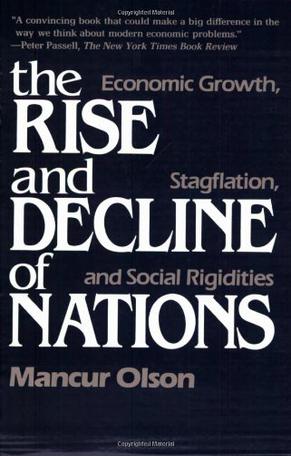
The Rise and Decline of Nations
The years since World War II have seen rapid shifts in the relative positions of different countries and regions. Leading political economist Mancur Olson offers a new and compelling theory to explain these shifts in fortune and then tests his theory against evidence from many periods of history and many parts of the world. “[T]his elegant, readable book. . . sets out to explain why economies succumb to the ‘British disease,’ the kind of stagnation and demoralization that is now sweeping Europe and North America. . . . A convincing book that could make a big difference in the way we think about modern economic problems.”—Peter Passell, The New York Times Book Review “Schumpeter and Keynes would have hailed the insights Olson gives into the sicknesses of the modern mixed economy.”—Paul A. Samuelson, Massachusetts Institute of Technology “One of the really important books in social science of the past half-century.”—Scott Gordon, The Canadian Journal of Economics “The thesis of this brilliant book is that the longer a society enjoys political stability, the more likely it is to develop powerful special-interest lobbies that in turn make it less efficient economically.”—Charles Peters, The Washington Monthly “Remarkable. The fundamental ideas are simple, yet they provide insight into a wide array of social and historical issues. . . . The Rise and Decline of Nations promises to be a subject of productive interdisciplinary argument for years to come.”—Robert O. Keohane, Journal of Economic Literature “I urgently recommend it to all economists and to a great many non-economists.”—Gordon Tullock, Public Choice “Olson’s theory is illuminating and there is no doubt that The Rise and Decline of Nations will exert much influence on ideas and politics for many decades to come.”—Pierre Lemieux, Reason Co-winner of the 1983 American Political Science Association’s Gladys M. Kammerer Award for the best book on U.S. national policy -
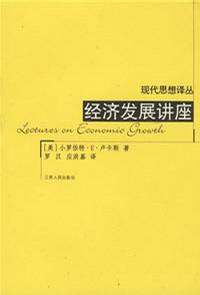
为何资本不从富国流向穷国
《经济发展讲座》收录了作者关于经济增长和发展的著作,包括1985年马歇尔讲座至1997年库兹涅茨讲座的讲义。书中修改原先仅用来描述工业国家经济行为的现代增长理论,使之能对存在巨大收入及增长率差异的富裕经济和贫穷经济作出一致的解释。 -
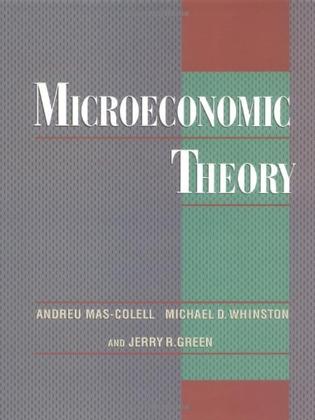
Microeconomic Theory
Many instructors of microeconomic theory have been waiting for a text that provides balanced and in-depth analysis of the essentials of microeconomics. Masterfully combining the results of years of teaching microeconomics at Harvard University, Andreu Mas-Colell, Michael Whinston, and Jerry Green have filled that conspicuous vacancy with their groundbreaking text, Microeconomic Theory. The authors set out to create a solid organizational foundation upon which to build the effective teaching tool for microeconomic theory. The result presents unprecedented depth of coverage in all the essential topics, while allowing professors to "tailor-make" their course to suit personal priorities and style. Topics such as noncooperative game theory, information economics, mechanism design, and general equilibrium under uncertainty receive the attention that reflects their stature within the discipline. The authors devote an entire section to game theory alone, making it "free-standing" to allow instructors to return to it throughout the course when convenient. Discussion is clear, accessible, and engaging, enabling the student to gradually acquire confidence as well as proficiency. Extensive exercises within each chapter help students to hone their skills, while the text's appendix of terms, fully cross-referenced throughout the previous five sections, offers an accessible guide to the subject matter's terminology. Teachers of microeconomics need no longer rely upon scattered lecture notes to supplement their textbooks. Deftly written by three of the field's most influential scholars, Microeconomic Theory brings the readability, comprehensiveness, and versatility to the first-year graduate classroom that has long been missing. -
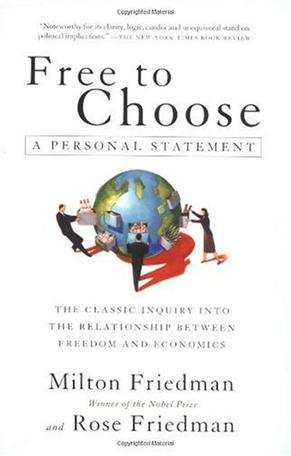
Free to Choose
Free to Choose (1980) is a book and a ten-part television series broadcast on public television by economists Milton and Rose D. Friedman that advocates free market principles. Free to Choose: A Personal Statement maintains that the free market works best for all members of a society, provides examples of how the free market engenders prosperity, and maintains that it can solve problems where other approaches have failed. Published in January 1980, the 297 page book contains 10 chapters. Milton Friedman won the Nobel Memorial Prize in Economics in 1976. Contrary to normal practice the book was written after the TV series was produced, although the line "Basis for the acclaimed public television triumph" is written on the front cover, using the program transcripts as reference. The book was on the United States best sellers list for 5 weeks. PBS telecast the series, beginning in January 1980; the general format was that of Dr. Friedman visiting and narrating a number of success and failure stories in history, which Dr. Friedman attributes to capitalism or the lack thereof (e.g. Hong Kong is commended for its free markets, while India is excoriated for relying on centralized planning especially for its protection of its traditional textile industry). Following the primary show, Dr. Friedman would engage in discussion with a number of selected persons, such as Donald Rumsfeld (then of G.D. Searle & Company). The series was rebroadcast in 1990 with Linda Chavez moderating the episodes. Arnold Schwarzenegger, Ronald Reagan, Steve Allen and others give personal introductions for each episode in the series. This time, after the documentary part, Friedman sits down with a single opponent to debate the issues raised in the episode. -

经济解释(卷二)
-
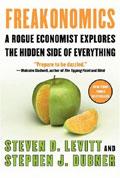
Freakonomics
Economics is not widely considered to be one of the sexier sciences. The annual Nobel Prize winner in that field never receives as much publicity as his or her compatriots in peace, literature, or physics. But if such slights are based on the notion that economics is dull, or that economists are concerned only with finance itself, Steven D. Levitt will change some minds. In Freakonomics (written with Stephen J. Dubner), Levitt argues that many apparent mysteries of everyday life don't need to be so mysterious: they could be illuminated and made even more fascinating by asking the right questions and drawing connections. For example, Levitt traces the drop in violent crime rates to a drop in violent criminals and, digging further, to the Roe v. Wade decision that preempted the existence of some people who would be born to poverty and hardship. Elsewhere, by analyzing data gathered from inner-city Chicago drug-dealing gangs, Levitt outlines a corporate structure much like McDonald's, where the top bosses make great money while scores of underlings make something below minimum wage. And in a section that may alarm or relieve worried parents, Levitt argues that parenting methods don't really matter much and that a backyard swimming pool is much more dangerous than a gun. These enlightening chapters are separated by effusive passages from Dubner's 2003 profile of Levitt in The New York Times Magazine, which led to the book being written. In a book filled with bold logic, such back-patting veers Freakonomics, however briefly, away from what Levitt actually has to say. Although maybe there's a good economic reason for that too, and we're just not getting it yet. --John Moe